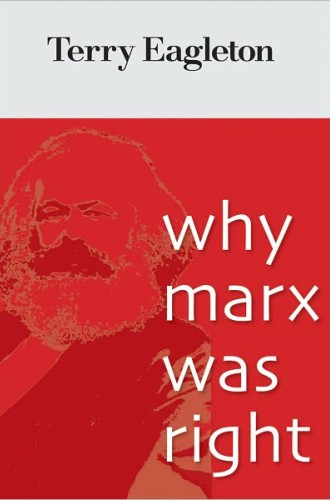Why Marx Was Right, by Terry Eagleton
Reading a book by Terry Eagleton is like watching fireworks. The reader can become so delighted with the rhetorical pyrotechnics that the force of the argument is lost. But for all the literary razzle-dazzle, Eagleton is a serious and determined critic of the capitalist status quo.
"This book had its origin in a single, striking thought," Eagleton begins: "What if all the most familiar objections to Marx's work are mistaken?" He then devotes each of ten chapters to refuting one of the major objections to Marx—to wit: Marx's age of factories, food riots and chimney sweeps has long been over. Marxism may be interesting as a theory, but in practice it produced Stalin and Mao. Marxist social theory is deterministic, suppressing human action in the ineluctable march of history. Marxism's goal is utopian. Marxism is reductionist and materialistic: everything is economics. The world of class struggle has passed away. Marxism supports violent revolution. The goals of Marxism can be realized only in an all-powerful state (Stalin and Mao again). Current radical movements for feminism, environmentalism and gay rights are not Marxist-inspired.
Read our latest issue or browse back issues.
This list of Marxism's shortcomings is common coinage, and Eagleton offers convincing counterarguments. But he also makes an underlying critique of the critics that is signaled in the clever title: Why Marx Was Right. Of course, we all know that Marx was on the radical left, but what struck me over and over again is Marx's conservative cast, which undercuts so many of the complaints: Marx was right—and on the right—because he based his analysis on a philosophy of history.
The Communist Manifesto's turn to history is demonstrated in its extraordinary appreciation for capitalism and a pointed rejection of various Victorian moralists who lamented capitalism's destructiveness. The moralists came in for withering criticism because their schemes were utterly detached from historical reality. John Ruskin, for example, sought to cure the barbarism of the factory with the honest crafts of the Middle Ages. For Marx this was the application of abstract moral theory to alien material. Capitalism was certainly amoral and destructive, but the solution was not nostalgia for handicrafts and Gothic architecture.
Marx's insistence on a philosophy of history is precisely where critics claim to find his fundamental flaw. These critics—and dictators flying the Marxist flag—claim that Marx postulated a deterministic march of history ending in utopia. But Marx rejects any such determinism. History, as Hegel (Marx's inspiration) pointed out, has two meanings: rerum gestarum (what happened) and historia (the record of what happened). For Hegel and Marx, there is no rerum gestarum until there is historia, a self-conscious statement and assessment of past, present and future. Volk who do not do historia have no rerum gestarum; nothing happens in their eternal present. Self-conscious historia, on the other hand, breaks with a past and projects a future; it is inherently revolutionary.
Eagleton quotes Marx: "History does nothing, it 'possesses no immense wealth,' it 'wages no battles.' It is man, real living man who does all that; . . . 'history' is not, as it were, a person apart, using man as a means to achieve its own aims; history is nothing but the activity of man pursuing his aims." Humanity makes history from a rupture and linkage of past and future.
To dismiss critics who point to Soviet communism as an empirical disproof of Marx, Eagleton cites an old Irish joke: A local rustic is asked how to get to the train station; he replies, "If I was going to the train station, I wouldn't start from here." Communism builds historically from the globalization of capitalism, not from the rural peasantry of czarist Russia.
Did Marx project heaven on earth, the utopia his critics claim? Eagleton says that he was a tragic thinker, not an optimist. A communist society would have plenty of problems. In a typical Eagletonian riff: "There would be child murders, road accidents, wretchedly bad novels, lethal jealousies, overweening ambitions, tasteless trousers and inconsolable grief." In that sort of "utopia" the gospel of the cross could certainly be preached.
Marx was opposed to Christianity because he saw it as a distraction from history, as pie in the sky by and by. The emphasis on history and material conditions is not, however, antithetical to the gospel, as liberation theologians bear witness. The gospel is not a message from above about an ideal; it commands a working out in the material and historical reality at hand. Liberation theology's base communities are the very opposite of a top-down five-year plan.
Eagleton's moral exasperation is so prominent that he runs the danger of being a Victorian moralist and thereby missing the threat of Marx's philosophy of history. Moral reform is always difficult, and history's disasters, shocks and revolutions are a great burden. We may reject the burden in utopianism, high-minded moralism, or entertainment—or by just giving the future over to the market's invisible hand. Jacques Derrida suggests that Marx is capitalism's "specter," the ghost that returns to claim that "the time is out of joint." Like Hamlet, we do not know what to make of this spectral presence, but we are left with the haunting sense there may be something rotten in the state of capitalism.






